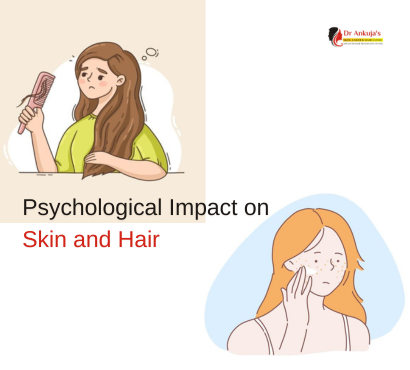Skin and hair shape first impressions, confidence, and social identities—especially in India’s appearance-conscious culture. It’s no surprise that conditions like acne, melasma, eczema, psoriasis, alopecia, and other disorders affect not just the body, but also the mind, self-esteem, and relationships. Often underestimated by outsiders, the psychological toll can disrupt daily life, trigger mental health challenges, and impact the entire family.
This blog explores how skin and hair conditions reshape psychological well-being, why the impact is so widespread, and what can be done—clinically and culturally—to support those affected.
Why Skin and Hair Matter to Mental Health
Human skin is both a physical barrier and a social interface. Hair is a deeply personal symbol of beauty, status, and health. When either is disrupted—by disease, loss, or damage—it can prompt feelings of shame, isolation, and loss of identity.
What Studies Reveal
- Up to 88% of people with visible skin diseases experience embarrassment in personal and professional contexts.
- 49% of individuals with skin conditions in surveyed populations report positive self-attitudes, compared to 63% without such conditions.
- Hair loss disorders, especially for women, trigger distress, low self-esteem, and feelings of helplessness—even when medical risk is low.
Common Skin and Hair Conditions That Affect Psychological Health
| Condition | Psychological Effects |
| Acne/Melasma | Depression, anxiety, loneliness |
| Psoriasis/Eczema | Social withdrawal, mood swings |
| Alopecia | Loss of identity, obsessive thoughts |
| Vitiligo | Stigma, low self-confidence |
| Scarring | Fear, sadness, avoidance of contact |
Women are disproportionately affected, but men, children, and teens also face unique challenges.
Mechanisms: Why the Mind Responds So Strongly
- Social stigma: Visible symptoms cause fear of judgment and exclusion, reinforcing a cycle of mental distress.
- Identity and beauty standards: Indian society often links “good skin” and “good hair” with marriage prospects, education, and job opportunities.
- Neuroendocrine link: The body’s stress response—via hormones like cortisol and the HPA axis—can worsen skin and hair conditions, forming a “vicious cycle”.
- Emotional distress: Pain, itching, and discomfort affect sleep, focus, and enjoyment, compounding anxiety and depression.
Psychological Symptoms & Quality of Life
Patients report:
- Lower self-esteem and confidence.
- Social isolation, difficulty forming relationships, and reluctance to participate in group activities.
- Anxiety and depression: Higher scores on PHQ-9 and UCLA Loneliness scales in Indian and international studies.
- Academic and work disruption: School avoidance, missed job opportunities, or premature resignation due to embarrassment.
For chronic or severe conditions, psychiatric comorbidities—including obsessive-compulsive behaviors or body dysmorphic disorder—may emerge.
Skin, Hair, and Mental Health: The Vicious Cycle
Emotional stress can flare psoriasis, trigger hair loss (telogen effluvium, alopecia areata), and worsen eczema or acne. In turn, worsening symptoms fuel further stress, creating a self-perpetuating cycle.
Case Example
A young woman develops severe acne during college. Avoids social outings for fear of judgment, internalizes blame, and reports persistent sadness. Treatment delays worsen both acne and mood, reinforcing isolation.
Supporting Patients: A Clinical and Social Approach
1. Psychological First Aid
- Empathy and nonjudgmental support are vital.
- Ask not just about physical symptoms, but also feelings and social impact.
- Routine quality of life assessments (DLQI, PHQ-9, GAD-7) can identify at-risk patients.
2. Counseling and Therapy
Coping strategies—CBT, mindfulness, peer support—help manage emotional fallout and build resilience. Dermatology-psychiatry liaison clinics are emerging globally to bridge the gap.
3. Family, School, and Workplace Support
- Culturally sensitive interventions—school counseling, family meetings, anti-bullying programs—can be transformative.
- Hairstylist and beauty professional outreach educates broader communities and reduces stigma.
Coping Strategies for Indian Patients and Families
- Connect with others facing similar challenges—online communities and support groups foster normalization and advice sharing.
- Practice positive self-affirmation—focus on strengths, not just appearance.
- Engage in creative expression—art, music, and journaling provide outlets for stress.
- Seek help early—early dermatology and psychological intervention leads to better outcomes.
FAQ
- Why do skin and hair problems cause so much emotional pain?
Skin and hair are integral to self-image and social experiences. Visible symptoms invite unwanted attention, criticism, or exclusion—especially when cultural standards are rigid. This can trigger anxiety, loneliness, and depression, affecting every aspect of daily life. - Can mental health treatment improve skin and hair conditions?
Yes—research confirms that therapy and psychiatric support can reduce emotional stress, improving both symptoms and overall well-being. Some studies even link antidepressant use to hair regrowth in conditions like alopecia areata. - How can families and schools help affected children?
Open dialogue, anti-bullying education, and avoidance of negative comments around appearance are essential. Encouraging healthy coping skills, building self-confidence, and seeking professional support can prevent long-term psychological harm.

